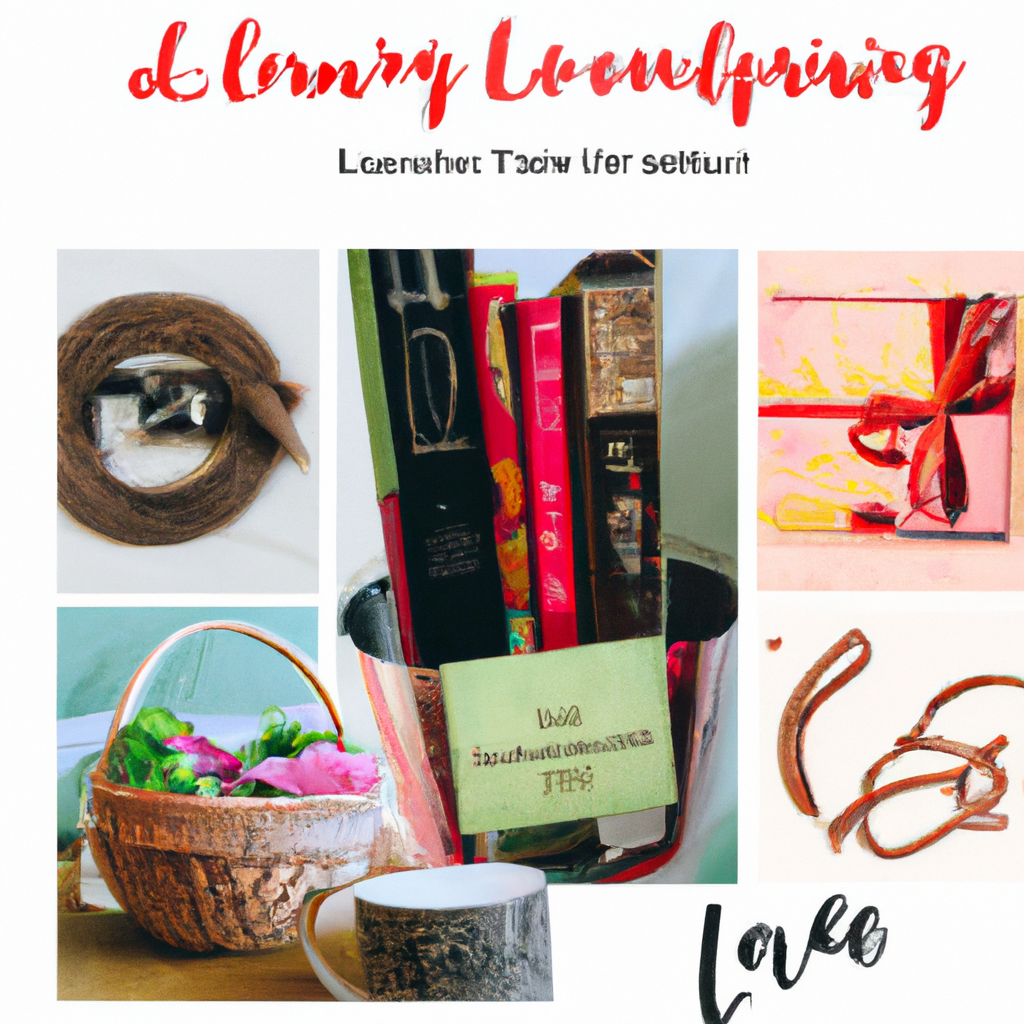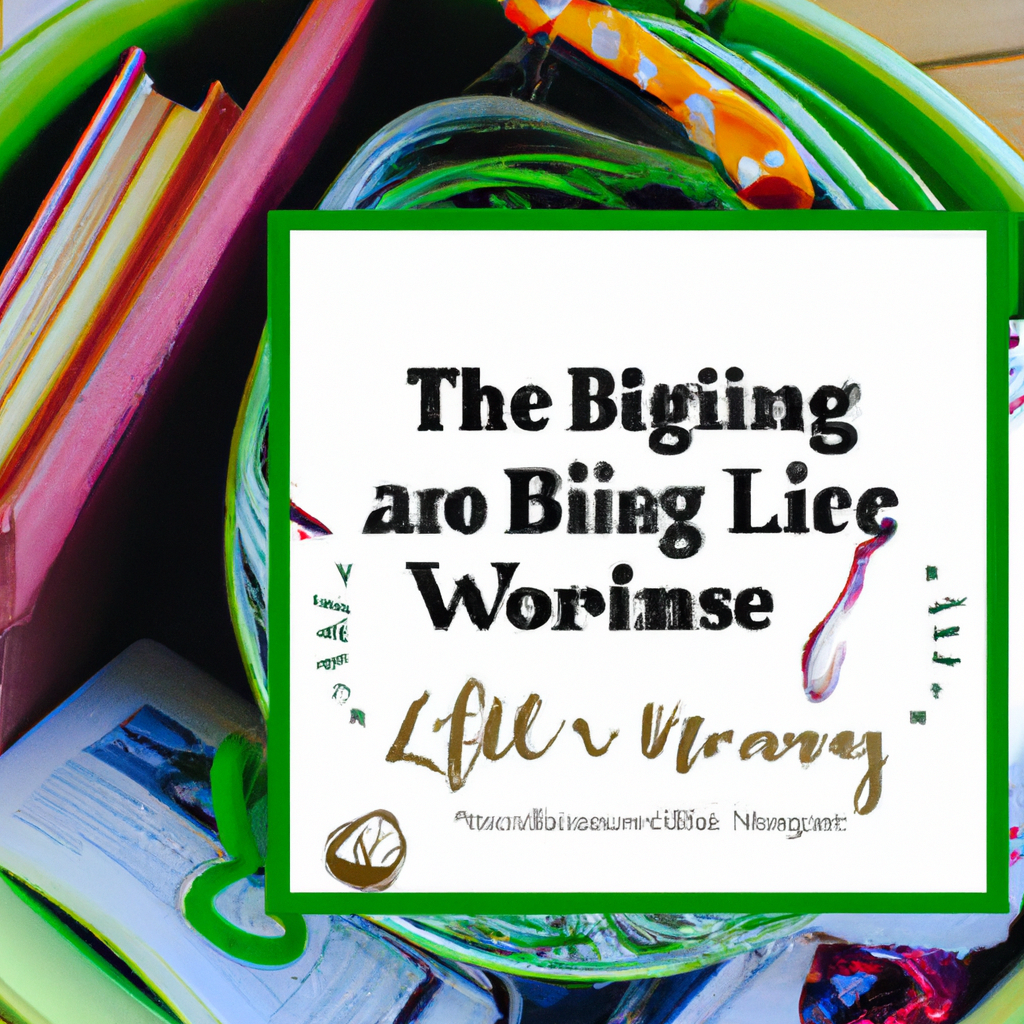
Are you a bookworm who is constantly seeking knowledge and expanding your horizons? If so, then Lifelong Learning: A Bookworm’s Gift Basket is the perfect treat for you! This delightful gift basket is specially curated to cater to the intellectual in you, with a collection of thought-provoking books, educational podcasts, and stimulating puzzles. Indulge in a world of endless learning opportunities and enhance your knowledge while enjoying the simple pleasure of reading. With Lifelong Learning: A Bookworm’s Gift Basket, the possibilities for personal growth are boundless. So grab a cup of tea, cozy up in your favorite reading nook, and embark on an exciting journey of lifelong learning.

The Importance of Lifelong Learning
Defining Lifelong Learning
Lifelong learning refers to the continuous acquisition of knowledge and skills throughout a person’s life. It goes beyond the boundaries of formal education and implies a commitment to personal growth and development. Lifelong learning is fueled by curiosity, a thirst for knowledge, and the understanding that learning is a lifelong journey rather than a destination.
Benefits of Continuous Acquisition of Knowledge
Engaging in lifelong learning offers numerous benefits both personally and professionally. On a personal level, it enhances self-awareness, critical thinking skills, and intellectual agility. It allows you to explore new interests, expand your horizons, and keep your mind active and engaged. Lifelong learning also promotes personal growth and self-improvement, leading to a greater sense of fulfillment and happiness.
Professionally, lifelong learning is essential in today’s rapidly evolving world. It enables you to adapt to new technologies, stay competitive in the job market, and even advance in your career. Continuous acquisition of knowledge enhances your problem-solving abilities, creativity, and innovation, making you a valuable asset to any organization. Moreover, lifelong learning fosters a growth mindset, which is crucial for navigating the challenges and changes in the workplace.
How Lifelong Learning Influences Personal and Professional Life
The impact of lifelong learning extends beyond personal enrichment and professional development. It has the power to transform your entire life. By embracing a lifelong learning mindset, you become open to new possibilities, experiences, and perspectives. You develop a sense of curiosity and an eagerness to explore the world around you. Lifelong learning enhances your ability to adapt to change and continuously improve yourself, leading to a more fulfilling and successful life overall.
The Role of Reading in Lifelong Learning
Reading as a Fundamental Skill for Lifelong Learning
Reading is a fundamental skill that serves as the foundation for lifelong learning. It is through reading that we gain access to information, ideas, and knowledge across various subjects. Reading enhances vocabulary, comprehension, and critical thinking skills, which are essential for processing and understanding new information.
Different Forms of Reading Material
Reading material comes in various forms, each offering unique benefits. Books, magazines, newspapers, articles, and online blogs are all sources of valuable information and ideas. Additionally, audio books and e-books provide alternative formats for accessing written content. By diversifying our reading materials, we can explore different styles, genres, and perspectives, further enriching our lifelong learning experience.
Benefits of Regular Reading
Regular reading has numerous benefits for lifelong learners. It expands our knowledge base, exposes us to new ideas, and helps us stay up-to-date with current events. Reading broadens our perspectives, fosters empathy, and cultivates a sense of curiosity. It improves our communication skills, vocabulary, and critical thinking abilities. Additionally, reading can be a source of inspiration, motivation, and personal growth as we learn from the experiences and wisdom of others.
Understanding the Bookworm Lifestyle
Who is a Bookworm?
A bookworm is an individual who has a deep passion for reading and finds solace, joy, and fulfillment in books. Bookworms have an insatiable appetite for knowledge and are often characterized by their love for reading and their extensive book collections. They value books as treasured companions, seeking refuge in their pages.
The Habits of a Bookworm
Bookworms typically have certain habits that differentiate them from occasional readers. They prioritize reading as a regular activity, setting aside dedicated time for immersion in books. They are constantly on the lookout for new literary discoveries and may often be found browsing bookstores, libraries, or online platforms for their next read. Bookworms often engage in discussions, book clubs, or online communities to share their love for reading and exchange recommendations.
How Being a Bookworm Supports Lifelong Learning
Being a bookworm inherently supports lifelong learning by fostering a deep and continuous engagement with books and knowledge. Bookworms actively seek out diverse genres and subjects, expanding their understanding of the world. Through reading, they are exposed to different perspectives, cultures, and ideas, which enriches their lifelong learning journey. Bookworms often become natural intellectuals, constantly seeking new knowledge and sharing their discoveries with others.
Expanding Knowledge through Different Types of Books
Fiction vs Non-Fiction: The Gains from Both
Fiction and non-fiction books offer distinct benefits for lifelong learning. While non-fiction books provide factual information and insights into real-world subjects, fiction books stimulate imagination and empathy. Non-fiction books can deepen our understanding of specific topics or industries, while fiction books allow us to explore different worlds, perspectives, and human experiences. Both types of books contribute to our personal and intellectual growth, making it important to embrace a balanced reading diet.
The Power of Biographies and Histories
Biographies and histories have a special place in the world of literature. They offer a glimpse into the lives of remarkable individuals and the events that shaped our world. By reading biographies, we gain inspiration from the achievements and struggles of others, while historical books allow us to learn from the past and understand how it has shaped the present. The power of biographies and histories lies in their ability to captivate us with real-life stories and teach valuable lessons that can be applied to our own lives.
How Science Fiction and Fantasy Stimulate the Mind
Science fiction and fantasy genres offer unique opportunities for imagination and intellectual stimulation. By exploring imaginary worlds, futuristic technologies, and magical realms, these genres ignite our creativity and expand our thinking. Science fiction encourages us to contemplate potential advancements in science and technology, while fantasy allows us to escape reality and explore alternative possibilities. Science fiction and fantasy books challenge our perception of reality and inspire us to think outside the box, contributing to our lifelong learning journey.
The Impact of Reading Diverse Genres
Reading diverse genres is crucial for holistic lifelong learning. Each genre offers its own set of perspectives, insights, and lessons. By exploring different genres, we expand our worldview, foster empathy, and deepen our understanding of various subjects. Diverse genres expose us to different writing styles, narrative structures, and literary techniques, enhancing our appreciation of literature and fostering a well-rounded approach to lifelong learning.

Building a Personal Library
Why Create a Personal Library
Building a personal library is a reflection of your commitment to lifelong learning. It provides a physical manifestation of your passion for books and serves as a valuable resource for continuous self-improvement. A personal library allows you to curate a collection of books that resonate with your interests, values, and aspirations, creating a personalized learning environment. Additionally, having a personal library provides easy access to books, fostering a reading habit and facilitating lifelong learning.
Choosing the Right Books for Your Collection
When building a personal library, it is essential to choose books that align with your personal and intellectual goals. Consider your interests, passions, and areas of curiosity when selecting books for your collection. Seek recommendations, explore different genres, and be open to discovering new authors and subjects. Building a well-rounded library that encompasses a variety of topics ensures that you can engage in continuous learning across various domains.
Organizing Your Book Collection
Organizing your book collection is key to maximizing its value and enhancing your lifelong learning experience. Various methods can be employed, depending on personal preferences. Some may choose to organize books alphabetically by author or topic, while others may prefer a more thematic arrangement. Regardless of the method, organizing your collection allows for easy retrieval and navigation, facilitating efficient learning and exploration within your personal library.
Making Use of Digital Libraries
In addition to physical books, digital libraries offer a wealth of resources for lifelong learning. E-books and online platforms provide easy and convenient access to a vast array of reading material. Digital libraries make it possible to carry an entire library in your pocket, enabling learning anytime and anywhere. Take advantage of digital libraries by exploring e-books, online articles, audiobooks, and other digital resources that complement your personal library and enhance your lifelong learning journey.
Book Recommendation Systems
Reading Lists and Book Clubs
Reading lists and book clubs are excellent resources for discovering new books and expanding your reading horizons. Reading lists curated by experts or individuals with similar interests can provide valuable recommendations that align with your preferences. Book clubs foster a sense of community, allowing you to engage in thoughtful discussions, exchange ideas, and explore different interpretations of books. These recommendation systems serve as catalysts for lifelong learning, introducing you to authors and genres you may not have encountered otherwise.
Online Recommendation Algorithms
Online platforms and recommendation algorithms have revolutionized the way we discover books. Through personalized recommendations based on our reading history and preferences, these algorithms expose us to a wide range of books that align with our tastes. By leveraging online recommendation systems, we can discover new authors, genres, and literary treasures that enhance our lifelong learning journey. However, it is important to balance algorithmic recommendations with personal judgment and exploration to ensure a diverse reading experience.
Leveraging Book Reviews for Book Selection
Book reviews are valuable tools for making informed choices when selecting books for your collection. They provide insights into the content, style, and impact of a book. By reading reviews from trusted sources or fellow readers, you can gain a better understanding of whether a book aligns with your interests and learning goals. However, keep in mind that reviews are subjective, and individual preferences may vary. Use book reviews as a helpful guide rather than the sole factor in your decision-making process.

Exploring Audiobooks and Their Advantages
Understanding Audiobooks
Audiobooks offer an alternative format for consuming written content. They are narrated versions of books, allowing listeners to engage with the content through audio. Audiobooks are available in various formats, including CDs, digital downloads, and streaming platforms. They have gained popularity due to their convenience and accessibility, enabling multitasking and reaching audiences who prefer auditory learning.
Benefits of Audiobooks
Audiobooks offer several advantages that facilitate lifelong learning. They provide flexibility, allowing you to listen while engaging in other activities such as exercising, commuting, or doing household chores. Audiobooks enhance listening skills and auditory comprehension, as they require active engagement to follow the storyline. They also serve as a valuable tool for individuals with visual impairments, making literature accessible to a wider audience. Audiobooks enrich the reading experience by adding a vocal dimension to the text and bringing characters and narratives to life.
Best Practices for Learning from Audiobooks
To maximize the learning potential of audiobooks, it is important to adopt certain best practices. Choose audiobooks with clear narration and high-quality production to ensure optimal listening experience. Take notes or engage in active listening by pausing the audio to reflect or internalize key points. Remember to balance audiobooks with other forms of reading for a well-rounded learning experience. By harnessing the advantages of audiobooks and incorporating them into your lifelong learning routine, you can expand your knowledge and embrace the joy of literature.
Role of Audiobooks in Lifelong Learning
Audiobooks play a significant role in lifelong learning by providing alternative avenues for accessing literature. They cater to different learning preferences and lifestyles, enabling individuals to engage with books despite time constraints or visual limitations. Audiobooks contribute to the development of listening skills, pronunciation, and vocabulary expansion. They enhance the overall reading experience and support lifelong learners in their pursuit of knowledge and personal growth.
Ebooks vs Physical Books
Pros and Cons of Ebooks
Ebooks offer numerous advantages for lifelong learners. They are portable, allowing you to carry an entire library in a single device. Ebooks can be easily accessed and downloaded, eliminating the need for physical storage space. They often provide features such as search functions, highlighting, and note-taking, enhancing the reading experience and facilitating knowledge retention. However, some individuals may find it challenging to concentrate on electronic screens for extended periods, and there may be limitations in terms of device compatibility or access to certain titles.
Pros and Cons of Physical Books
Physical books have their own unique appeal and benefits in the world of lifelong learning. They provide a tactile experience, allowing for a sensory connection with the content. Physical books can be cherished collectibles, offering a sense of nostalgia and aesthetic pleasure. They are not reliant on electronic devices or batteries, ensuring access to literature even in situations where technology is unavailable or unreliable. However, physical books can be bulky and require storage space. They may also be less portable compared to ebooks and lack certain interactive features.
Balancing Ebooks and Physical Books in Lifelong Learning
The choice between ebooks and physical books ultimately depends on personal preferences and circumstances. Balancing both formats in your lifelong learning journey allows you to reap the benefits of each. Ebooks offer convenience, easy access, and interactive features for efficient learning on the go. Physical books provide a tangible and immersive reading experience, promoting focus and engagement. By embracing both formats, you can create a versatile learning environment that caters to your various needs and preferences.

The Art of Note Taking
Importance of Note Taking in Reading
Note taking is a valuable skill that enhances reading comprehension, critical thinking, and knowledge retention. It helps you actively engage with the content, summarize key points, and extract meaningful insights. Through note taking, you create a personalized record of your learning journey, allowing for easy review and reference. Taking notes while reading promotes a deeper understanding of the material and enables you to connect ideas and concepts across different texts.
Different Note Taking Strategies
There are various note-taking strategies that you can employ while reading. Some individuals prefer traditional methods such as highlighting or underlining key passages and jotting down annotations in the margins. Others may opt for more structured approaches, such as creating mind maps, concept webs, or summarizing main ideas in bullet points. Experiment with different strategies to find what works best for you and aligns with your learning objectives. The key is to develop a system that enhances your comprehension, facilitates review, and supports lifelong learning.
How Note Taking Enhances Understanding and Recall
Note taking improves understanding and recall by promoting active engagement with the material. When you take notes, you are forced to process the information, synthesize key points, and make connections with prior knowledge. This cognitive effort strengthens neural pathways, facilitating long-term memory retention. By revisiting your notes periodically, you reinforce the acquired knowledge, refresh your memory, and solidify your understanding. Note taking transforms passive reading into an active learning experience, enabling you to fully absorb and internalize the content.
Keeping the Learning Flame Burning
Continuing Education Resources
Continuing education resources are invaluable for lifelong learners. They offer formal and informal learning opportunities beyond traditional classroom settings. Online courses, webinars, workshops, and professional development programs provide opportunities for acquiring new skills and knowledge. Some organizations also offer mentorship or coaching programs that facilitate personal and professional growth. By actively seeking out continuing education resources, you can ensure that your lifelong learning journey remains dynamic and relevant.
Self-Learning Strategies
Self-learning strategies empower individuals to take ownership of their lifelong learning journeys. They involve setting clear goals, creating learning plans, and engaging in self-directed study. Self-learning can be achieved through various methods such as reading books, watching educational videos, participating in online forums, or conducting independent research. By cultivating self-discipline and curiosity, you can continuously pursue knowledge and personal growth on your own terms.
Overcoming Challenges to Lifelong Learning
Lifelong learning is not without its challenges. Time constraints, competing priorities, and lack of motivation can hinder one’s commitment to continuous learning. Overcoming these challenges requires self-awareness, perseverance, and strategic planning. Prioritize learning by allocating dedicated time in your schedule and integrating it into your daily routine. Set realistic goals and break them down into manageable steps to maintain momentum. Surround yourself with a supportive network of fellow learners or join communities that foster a culture of lifelong learning. By acknowledging and addressing the challenges, you can navigate the obstacles and keep the flame of lifelong learning burning bright.
In conclusion, lifelong learning is the gift that keeps on giving. It enhances personal and professional growth, stimulates the mind, and opens doors to new opportunities. Reading, in particular, plays a crucial role in lifelong learning by providing access to a vast array of knowledge and ideas. By embracing a bookworm lifestyle, building a personal library, utilizing book recommendation systems, and leveraging various formats such as audiobooks, ebooks, and physical books, you can embark on a lifelong learning journey filled with joy, fulfillment, and continuous growth. So, grab a book, immerse yourself in its pages, and let the world of lifelong learning unfold before you.

